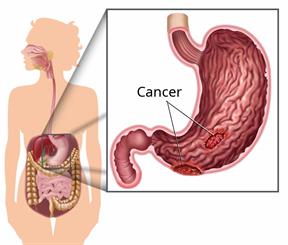Stomach Cancer

Stomach cancer is also called gastric cancer. It is an abnormal growth of cancerous (malignant) cells in the stomach.
What are the causes?
The exact cause of stomach cancer is not known.
What increases the risk?
You are more likely to develop this condition if you:
Are older than 65 years of age.
Are male.
Eat a diet that includes a lot of foods that are smoked, salted, or pickled.
Use any tobacco products, including cigarettes, chewing tobacco, or e-cigarettes.
Drink alcohol excessively. This means more than 2 drinks a day for men and more than 1 drink a day for women.
Are overweight.
- Have a history of:
Stomach surgery.
Chronic gastritis.
Stomach polyps.
Pernicious anemia.
- Have any of the following:
A Helicobacter pylori stomach infection.
A family history of stomach cancer.
Blood type A.
An Epstein–Barr virus (EBV) infection.
Common variable immune deficiency (CVID).
Work in conditions that expose you to coal, metal, or rubber.
What are the signs or symptoms?
In early stages, this condition does not usually have any symptoms. As the condition gets worse, common symptoms include:
Loss of appetite.
Feeling full after eating a small meal.
Pain in the abdomen, usually above the belly button.
Heartburn, indigestion, or nausea.
Losing weight without trying.
Excessive gas or belching.
Other symptoms include:
Feeling tired (fatigue).
Swelling or fluid buildup in the abdomen.
Trouble swallowing.
Vomiting. This may include vomiting blood.
Bloody stool (feces).
Dark red or black coloring of the stool.
How is this diagnosed?
This condition may be diagnosed based on:
Your symptoms and medical history.
A physical exam.
Blood tests.
A procedure in which a tube with a light and a camera on the end is inserted through your mouth and moved down your throat to your stomach (endoscopic exam). This may include removal of a sample of stomach cells to be tested for cancer (biopsy).
A procedure in which you swallow a solution (barium) before X-rays are done to evaluate the stomach and other structures (barium swallow). The barium shows up well on X-rays, making it easier for your health care provider to see possible problems.
Imaging tests, such as a CT scan, MRI, X-ray, or PET scan.
Your cancer will be assessed (staged) to determine how severe it is and how much it has spread (metastasized).
How is this treated?
Treatment for stomach cancer depends on the type and stage of the cancer. Treatment may include one or more of the following:
Surgery to remove as much of the cancer as possible (gastrectomy). This surgery may also involve removing nearby lymph nodes to be checked for cancer cells.
Medicines that kill cancer cells (chemotherapy).
High-energy rays that kill cancer cells (radiation therapy).
Targeted therapy. This targets specific parts of cancer cells and the area around them to block the growth and the spread of the cancer. Targeted therapy can help to limit the damage to healthy cells.
Immunotherapy. This uses medicines that help your body's disease-fighting system (immune system) fight cancer cells.
Follow these instructions at home:
Eating and drinking
General instructions
-
Do not use any products that contain nicotine or tobacco. These products include cigarettes, chewing tobacco, and vaping devices, such as e-cigarettes. If you need help quitting, ask your health care provider.
-
Take over-the-counter and prescription medicines only as told by your health care provider.
-
Consider joining a support group for people who have been diagnosed with stomach cancer.
-
Work with your health care provider to manage any side effects of treatment.
-
Keep all follow-up visits. Your health care provider will want to monitor your condition and your treatment.
Contact a health care provider if:
-
You have a fever.
-
You have difficulty eating.
-
You have problems with your medicines.
-
You continue to lose weight without trying.
-
You have nausea, diarrhea, sweating, and red skin (flushing) after eating. This combination of symptoms is called dumping syndrome.
- You have any of the following problems that do not get better with medicine:
Pain.
Nausea or vomiting.
Diarrhea.
Summary
-
Stomach cancer is also called gastric cancer. It is an abnormal growth of cancerous cells in the stomach.
-
Your cancer will be assessed to determine how severe it is and how much it has spread.
-
Work with your health care provider to manage any side effects of treatment.
-
Consider joining a support group for people who have been diagnosed with stomach cancer.
This information is not intended to replace advice given to you by your health care provider. Make sure you discuss any questions you have with your health care provider.
